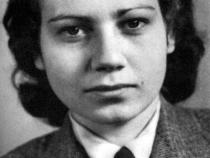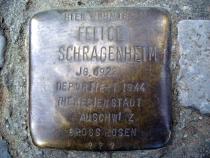Location
Friedrichshaller Str. 23
District
Schmargendorf
Stone was laid
22 October 2004
Born
09 March 1922 in Berlin
Deportation
on 05 September 1944
to
Theresienstadt
Later deported
on 09 October 1944
to
Auschwitz
Later deported
in February 1945
to
Groß-Rosen
Murdered
in Bergen-Belsen
Felice Rahel Schragenheim was born in Berlin on 9 March 1922. Her parents, Erna and Albert Schragenheim, were dentists. Felice attended the Bismarck Lyceum in Grunewald (later renamed Johanna von Puttkamer Lyceum) until she was forced to leave, following the night of pogroms. She was not able to complete her school-leaving examinations. Her leaving report is dated 15 November 1938.
By that time, she had already lost both her parents. Her mother died in a car accident in 1930; her father of a heart attack in 1935. Felice hoped to join her uncle in the United States but her plans were finally frustrated in July 1944, when the United States prepared to enter the war. By then, her sister Irene had been living in England for some years and her stepmother, Käte Hammerschlag, had moved to Palestine.
Felice was recruited as a forced labourer in a bottle-top factory. On 6 August 1942, her grandmother Hulda Karewski (aged 74) and great uncle Julius Philipp (aged 78) were deported to Theresienstadt, where they died in September. When Felice, too, received her deportation notice in October 1942, she went into hiding.
In November 1942, Felice was introduced to Lilly Wust, a mother of four boys whose husband was serving in the German army. They became intimate friends and fell in love. In April 1943, Felice moved in with Lilly to her home in Berlin-Schmargendorf. For over a year, they lived together in relative safety. But on 21 August 1944, the Gestapo came for Felice, and sent her to the “Jews’ assembly camp” in Wedding.
From here, she was deported to Theresienstadt and then, on 9 October 1944, to Auschwitz. A week later, she was sent on foot to Groß Rosen, now in Poland. Together with 1000 other women, Felice was taken to Kurzbach (Buko?owo) subcamp, 25 kilometres from Breslau, where the women were made to shift tree trunks and dig tank traps. In November, Felice contracted scarlet fever and was taken to hospital in Trachenberg (?migród). Here she was able to write Lilly several letters and expressed her hope to be able to stay in hospital until the camp’s liberation.
But Felice was sent back to Kurzbach in mid-November. On 25 January 1945, the first prisoners were evacuated from the camp. The women were made to march in the freezing cold for eight days until they reached Groß Rosen, where they stayed for two weeks. They were subsequently taken to Bergen-Belsen in open cattle cars. No more was seen or heard of Felice after that.
Documents owned by Felice’s relative Martin Feuchtwanger state that she died in March 1945. On her official death certificate, 31 December 1944 is given as her date of death and “embolism” as the cause.
By that time, she had already lost both her parents. Her mother died in a car accident in 1930; her father of a heart attack in 1935. Felice hoped to join her uncle in the United States but her plans were finally frustrated in July 1944, when the United States prepared to enter the war. By then, her sister Irene had been living in England for some years and her stepmother, Käte Hammerschlag, had moved to Palestine.
Felice was recruited as a forced labourer in a bottle-top factory. On 6 August 1942, her grandmother Hulda Karewski (aged 74) and great uncle Julius Philipp (aged 78) were deported to Theresienstadt, where they died in September. When Felice, too, received her deportation notice in October 1942, she went into hiding.
In November 1942, Felice was introduced to Lilly Wust, a mother of four boys whose husband was serving in the German army. They became intimate friends and fell in love. In April 1943, Felice moved in with Lilly to her home in Berlin-Schmargendorf. For over a year, they lived together in relative safety. But on 21 August 1944, the Gestapo came for Felice, and sent her to the “Jews’ assembly camp” in Wedding.
From here, she was deported to Theresienstadt and then, on 9 October 1944, to Auschwitz. A week later, she was sent on foot to Groß Rosen, now in Poland. Together with 1000 other women, Felice was taken to Kurzbach (Buko?owo) subcamp, 25 kilometres from Breslau, where the women were made to shift tree trunks and dig tank traps. In November, Felice contracted scarlet fever and was taken to hospital in Trachenberg (?migród). Here she was able to write Lilly several letters and expressed her hope to be able to stay in hospital until the camp’s liberation.
But Felice was sent back to Kurzbach in mid-November. On 25 January 1945, the first prisoners were evacuated from the camp. The women were made to march in the freezing cold for eight days until they reached Groß Rosen, where they stayed for two weeks. They were subsequently taken to Bergen-Belsen in open cattle cars. No more was seen or heard of Felice after that.
Documents owned by Felice’s relative Martin Feuchtwanger state that she died in March 1945. On her official death certificate, 31 December 1944 is given as her date of death and “embolism” as the cause.




